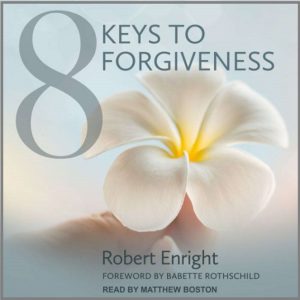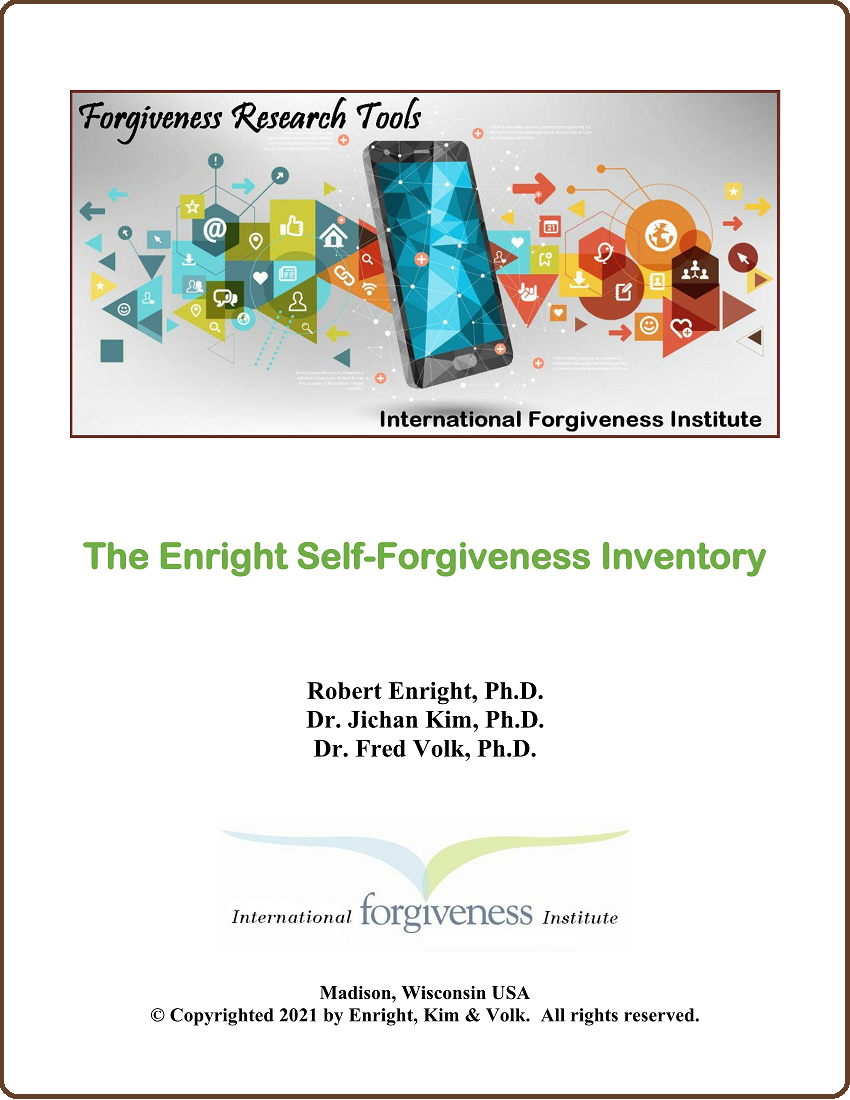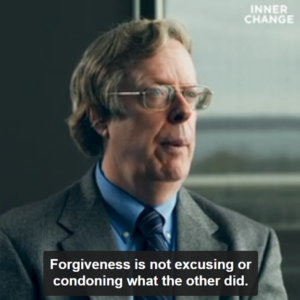Tagged: “forgiveness journey”
DOES PRACTICING THE VIRTUE OF FORGIVENESS MAKE YOU A MORE LOVING PERSON?
How many times have you heard or been asked the age-old question of: “Which came first, the chicken or the egg?” While that problematic conundrum may never be adequately answered, researchers are confident they are making inroads into solving a similar enigma: “Which is first required to engender the other, forgiveness or love?”
A just-published research study by world-renowned forgiveness trailblazer Dr. Robert Enright and three of his associates helped provide some answers to that larger question by examining three related questions:
- Do forgiveness and love develop together?
- Does love or forgiveness predict the other at a later time?
- Does one’s spirituality moderate the relationship between forgiveness and love?
The study, The Development of Forgiveness and Other-focused Love, was published last month in the online version of the Journal of Psychology and Theology, a peer-reviewed academic journal. It explores the development of forgiveness and other-focused love and examines the role of spirituality in the relationship between forgiveness and love.
As part of the study, participants from a large Christian university filled out measures of compassionate love, forgiveness, and dedication to God at Time 1 (T1) and measures of love and forgiveness after 4 weeks at Time 2 (T2). While love at T1 did not predict forgiveness at T1 or T2, forgiveness at T1 positively predicted love at T2, indicating that forgiveness temporally preceded love.
“Because the aim of the study was to see the natural unfolding of forgiveness and love over time, there was no treatment or intervention between T1 and T2,” according to study researcher Jican J. Kim, an Associate Professor of Psychology and Director of the M.A. in Applied Psychology program at Liberty University, Lynchburg, VA. “The results, however, suggest that we may be able to help people grow in other-focused love by helping them to forgive. That’s a really dramatic revelation.”
Dr. Enright emphasized those findings by explaining that the study shows a possibility that as one grows in the virtue of forgiveness (toward a specific offender), the person might experience growth in love toward others in general, thus becoming a more loving person (through the act of forgiveness toward a particular offender).
“In theory, this idea seems to have merit because a forgiving person must be able to love the most unlovable person–one’s offender,” Dr. Enright added. “That kind of love, what we call agape love, might make loving others in general comparably easy.”
The evidence from this study, together with findings from other recent empirical studies, have only begun to examine the development and relationship between forgiveness and love—a relatively new focus for forgiveness researchers. Further research needs to be done to document in what ways one’s practice of forgiveness results in greater love toward others.
The two researchers agree, however that it is time to extend forgiveness interventions with adults to not only focus on psychological healing of the unjustly treated but also to investigate how forgiveness can promulgate the development of other-focused love.
“The fact that forgiveness can increase love at a later time tells me that love and forgiveness grow together and the practice of forgiveness is a concrete
expression of love that matures over time.”
Dr. Jichan J. Kim
Read the full report: The Development of Forgiveness and Other-focused Love
Research Report Authors:
- Jiahe Wang Xu is a graduate student in the Department of Educational Psychology at the University of Wisconsin-Madison. Her research interest is in forgiveness and the development of agape love.
. - Jichan J. Kim (Ph.D., University of Wisconsin-Madison) an Associate Professor of Psychology and the Director of the M.A. in Applied Psychology program at Liberty University, Lynchburg, VA. His research focuses on interpersonal, self-, and divine forgiveness.
. - Naomi Olmstead (M.A. Psychology, Liberty University) is a secondary educator at Lanakila Baptist School, Ewa Beach (island of O’ahu), Hawaii.
. - Robert D. Enright holds the Aristotelian Professorship in Forgiveness Science within the Department of Educational Psychology at the University of Wisconsin-Madison and is a founding board member of the International Forgiveness Institute in Madison, Wisconsin.
Forgiveness and Finding Meaning in Sacrifice
〈This is an excerpt from my book, 8 Keys to Forgiveness, W. W. Norton & Company, 2015.〉
When you sacrifice for others, you are doing a lot more than acting in service to them. They may be bleeding emotionally inside, and you then bleed inside to help them stop bleeding inside. For example, Brian’s mother, Yolanda, was overly-controlling toward him and his partner, Simone. Instead of distancing himself from Yolanda, he spent time gently giving her examples of her not letting him, in her own mind, develop independence in adulthood. This took energy, a checking of his anger so it did not spill out to her, and some suffering on his part to help her to understand.
Of course, we have to exercise temperance here too. Sacrifice does not mean that you do damage to yourself. The paradox is that as you sacrifice for others, you experience emotional healing.
Dr. Frankl, in his book, Man’s Search for Meaning, provides a remarkable case study of the kind of meaning one can find in sacrificing for others. His example is not in the context of forgiveness. I relate it to you so that you can see how sacrifice works and becomes an aid to the one who is doing the sacrificing. An elderly physician came to see Dr. Frankl because of the loss of his wife 2 years earlier. Dr. Frankl saw that he was psychologically depressed. His question to the physician was this: “What would have happened to your wife if you were the one to go first?” With that question a bigger picture opened for the physician. Had he gone first, then it would have been his beloved wife who would be visiting Dr. Frankl for her depression. By her going first, she was spared years of grief. The physician then understood that he could willingly take on the suffering on behalf of his wife……….
Can you see how a sacrificial attitude, within reason, could aid you in forgiving and in overcoming resentment? I say within reason because you do not want to overdo this either. If a person refuses to hear what you have to say, or refuses to accept your sacrificial gestures and begins to use you, then it is time to reexamine the approach. None of these approaches is foolproof. If you see  benefit in the sacrificial attitude and related behaviors, then what is your particular plan? What will you do that is hard for you to do in service to the other? How long will you give this undertaking? Do you see even a glimmer of evidence……that the other is open to even small change? Be sure to monitor your coping level during this exercise so that the sacrifice does not lead to an even greater resentment. If that begins to happen over a period of time, then it is time to reevaluate this particular approach in your case. If, on the other hand, it seems to be working, then stay at it as long as you can and as long as the other is willing to work with you in changing behaviors.
benefit in the sacrificial attitude and related behaviors, then what is your particular plan? What will you do that is hard for you to do in service to the other? How long will you give this undertaking? Do you see even a glimmer of evidence……that the other is open to even small change? Be sure to monitor your coping level during this exercise so that the sacrifice does not lead to an even greater resentment. If that begins to happen over a period of time, then it is time to reevaluate this particular approach in your case. If, on the other hand, it seems to be working, then stay at it as long as you can and as long as the other is willing to work with you in changing behaviors.
Reflect on the possibility that without your forgiveness, that person may never learn to live well. You may be playing a part in helping him or her grow deeply as a person. How might that be? He or she is being given a chance to see what genuine love is and to see it in action. Your sacrificial approach may even be playing a part in the very survival of this person. Of course, you do not want to go so far with this sacrifice that you do damage to yourself. Instead, the point here is that as you give of yourself, within reason, this giving might prove to be emotionally healing for you. When you are ready, write down your answer to the question of how you may be aiding the other’s healing.
Dr. Frankl then gives the reader an insight that is worth remembering: Sacrifice changes as soon as it is linked to a sound meaning that underlies it. The physician now had a meaning for going on, and his willing acceptance of outliving his wife was a sign that he loved her and wanted her safe.
Robert
I am amazed that some people still do not understand and appreciate forgiveness, whether it is the giving or the receiving of it. Why are there so many people who don’t understand or accept forgiveness?
I think one reason why people do not understand forgiveness is because we so rarely take forgiveness deeply seriously in any society. For example, when have you heard, in a family or a classroom, an extended discussion of what forgiveness is and why it is important? I think it is time to change that and start discussions of what forgiveness is and what it is not. Why some reject forgiveness, I think, has two answers. First, some people misunderstand forgiveness as weakness or as automatic reconciliation with hurtful other people. Second, some people are so profoundly angry that their resentment then gets in the way of their own healing as they reject the idea of forgiveness.
Forgiveness Research Tools Flying Out the Door and Around the World
When The Christian Science Monitor called him “the father of forgiveness research” nearly 20 years ago (Dec. 19, 2002), Dr. Robert Enright, a University of Wisconsin-Madison educational psychology professor, had just completed what the news organization called “the first study ever to show a cause-and-effect finding regarding physical health. . . and forgiveness.”
Today, as Dr. Enright nudges close to 37 years of forgiveness study and interventions, his research tools and techniques have become the preferred instruments of social scientists and researchers around the world. To stimulate even further growth in the burgeoning field, the forgiveness pioneer is giving his research tools away at no cost and with no strings attached.
On April 20 of this year, Dr. Enright announced that the non-profit educational organization he founded–the International Forgiveness Institute (IFI)–would provide his highly regarded scientific research tools absolutely free to any forgiveness researcher who requested them. In just the four months since then, the IFI has received and fulfilled orders for 252 copies of his individual tool documents from researchers in 21 foreign countries and 27 US states.
The free research tools available from the IFI and the number of copies distributed since April include:
- The Enright Self-Forgiveness Inventory (ESFI) – 76 Requests
This measure is based on the conceptualization of forgiveness as a moral virtue. The ESFI is a 30-item scale featuring six subscales with five items each. Five additional items at the end of the scale allow for measurement of Pseudo Self-Forgiveness (PSF). Although several competing self-forgiveness measures exist, Dr. Enright’s is the only one that captures the idea that self-forgiveness is a moral virtue that includes behavior toward the self.
- The Enright Forgiveness Inventory-30 (EFI-30) – 85 Requests
This tool is a shorter version of the Enright Forgiveness Inventory for Adults that has become the interpersonal forgiveness measure of choice for research professionals in the U.S. and abroad since its development in 1995. The EFI-30 reduces the number of items from 60 to 30 for the purpose of a more practical assessment of this construct. Data from the United States were used in the creation of the new measure and applied to seven nations: Austria, Brazil, Israel, Korea, Norway, Pakistan, and Taiwan to develop its psychometric validation.
- The Enright Group Forgiveness Inventory (EGFI) – 44 Requests
The EGFI has 56 items across seven subscales with each subscale having eight items. Those subscales measure a group’s motivation and values regarding forgiveness, peace, and friendliness toward the other group. The instrument is a valuable tool that could enhance peace efforts in the world. The EGFI was validated and published earlier this year by Dr. Enright and a team of 16 international researchers who collected data from 595 study participants in three different geographic and cultural settings of the world—China and Taiwan, Slovenia, and the US.
- The Enright Forgiveness Inventory for Children (EFI-C) – 47 Requests
The EFI-C is an objective measure of the degree to which a child forgives another who has hurt him or her deeply and unfairly. It is a 30-item scale similar to the 60-item adult version and is presented orally to very young children and in writing to those who can read well. Thanks to a researcher in Pakistan, the EFI-C is now available in the Urdu language—the native language of an estimated 230 million people, primarily in South Asia.
“Making these tools available to researchers at no cost is one way to grow the repository of forgiveness knowledge,” Dr. Enright explained. “This area of moral development has produced significant advancements in the areas of education, medical treatment, and therapy, so why not encourage others to help expand that information base?”
“There’s no getting around it – forgiveness is good for you and holding a grudge is not.”
-The Christian Science Monitor
- Learn more and order Dr. Enright’s free tools on the Forgiveness Research Tools page.
- Read how the EFI-30 was tested and validated in 8 countries around the world.
- Read the entire forgiveness article in The Christian Science Monitor.
This is what forgiveness is not. . .
A newly-released video interview with forgiveness expert Dr. Robert Enright called “This is what forgiveness is not” is now available to view at no cost on the website Inner Change.
The 3 min. 22 sec. video was recorded by a film production studio based in Switzerland that has cinematic staff in the US and more than a dozen other countries around the world. It is one of 13 short video segments that Inner Change has recorded with Dr. Enright and which it will release over a 2-year period. Thus far, five of the Dr. Enright interviews have been made available:

Dr. Robert Enright, founder of the International Forgiveness Institute.
- This is what forgiveness is not – Dr. Enright outlines four aspects of what forgiveness is not:
- It is not excusing or condoning.
- It is not forgetting but remembering in new ways.
- It does not necessarily mean reconciliation although it could happen if the other becomes trustworthy.
- When you forgive, you do not throw justice away, you bring it alongside.
- The Essence and Definition of Forgiveness (2 min. 15 sec.) – In this interview, Dr. Enright defines forgiveness from an interdisciplinary, cross-cultural, and interfaith perspective that basically includes what Socrates would call the “essence” or “core” of forgiveness.
. - How I Became Involved in Forgiveness Studies (4 min. 16 sec.) – Dr. Enright explains how after years of studying moral development at the behest of his employer, the University of Wisconsin-Madison, he asked himself, “What might make a difference in the world in people’s lives?” The answer he came up with in 1985 was “the virtue of forgiveness” which he saw as a way to heal from the injustices we all face.
. - The Two Paradoxes of Forgiveness (1 min. 0 sec.) – In this brief segment, Dr. Enright outlines the two paradoxes (apparent contradictions that are not contradictions) of forgiveness: 1) by forgiving, you are giving unexpected goodness to the person who hurt you; and, 2) in the process, you become stronger and emotionally healed.
- Learning to Forgive in the Small Things (3 min. 19 sec.) – By practicing forgiveness with the smaller hurts in your life, what Dr. Enright calls “exercising your forgiveness muscles,” you can become forgivingly fit and more easily handle the larger injustices in life.
The Inner Change website includes interviews with psychologists, spiritual teachers, activists, and neurologists. Those interviews are part of the website’s “Peace Video Library” where visitors can “discover what it means to be fully human, what resources we all share, how we can tap into our full potential as humans.” Other website features include musical meditation segments following each video and a collection of more than 30 music videos all with original songs recorded at Chernobyl (the site of the 1986 nuclear power plant disaster in the Soviet Union) and the nearby ghost town of Prypiat in Northern Ukraine.



